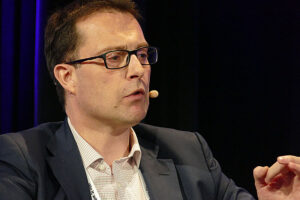ETFs are increasing in popularity, but is the European market keeping up with the demand? The US is setting an example that Europe should follow, according to Citi Group’s Ben Miller, but market fragmentation remains a key issue. Read on for more on TradeTech’s ETF discussion.
ETFs are facing two main challenges: fragmentation and regulation. So said Simon Barriball, EMEA ETF and portfolio trading at Virtu Financial. Along with each ETF having multiple listing and reporting structures differing across venues, the upcoming impact of the US move to T+1, double listings post-Brexit and low liquidity across European exchanges, regulation is set to intensify. Barriball voiced his disagreement with the expected CSDR Refit fine increases, which he called “disproportionately large”.

On top of that, although a European consolidated tape is finally in development, there’s no focus expected on ETFs, he continued. Although ETFs are rising in popularity, there are a number of hurdles they still need to overcome.
To do so, Ben Miller, vice president of ETF specialist sales for EMEA at Citi Group, advised that Europe should adopt some structural change from the US’s ETF approach. He advocated for a dominant exchange, currency and clearing system to be agreed on, along with a centralised tape and centralised clearing time, in order to improve European fragmentation. The structure of European cash equities was also upheld as a model, providing more choice for traders.
He went on to say that while Europe has had similar success to the US when it comes to institutional adoption, the US has had considerable more retail uptake. This is something Europe needs to emulate, he argued, in order to improve the ETF landscape.
Exchanges are adapting to deal with increased ETF demand, which David Smith, head of ETF sales at SIX Swiss Exchange, said includes launching on-exchange RFQs and

encouraging education in the space. With increased ETF algos on screen, he explained, the right functionality is needed to allow for market growth.
Returning to the everpresent theme of Europe’s liquidity problems, Barriball reported that the majority of the market is looking for organic growth without regulatory interventions. Exchange initiatives are one way that this is being achieved, along with algo development in the broker community, he said.
However, he acknowledged that some are keen for regulators to step in and introduce a trade-through rule. While this would improve liquidity, the required technology and monetary investments to achieve it are likely to discourage many market participants.

All in all, the European ETF ecosystem needs time to grow, Citi Group’s Miller said. Currently, Tim Miller, senior trader at Fidelity International, stated, the industry is currently at an “inflection point” when it comes to ETFs. Technology is developing to solve problems intrinsic to European ETFs, he said, filling gaps in the infrastructure and increasing flow on exchange. This, in turn, will prompt growth in the ETF market, he assured; “the little bits of the jigsaw are coming together”.
©Markets Media Europe 2024
